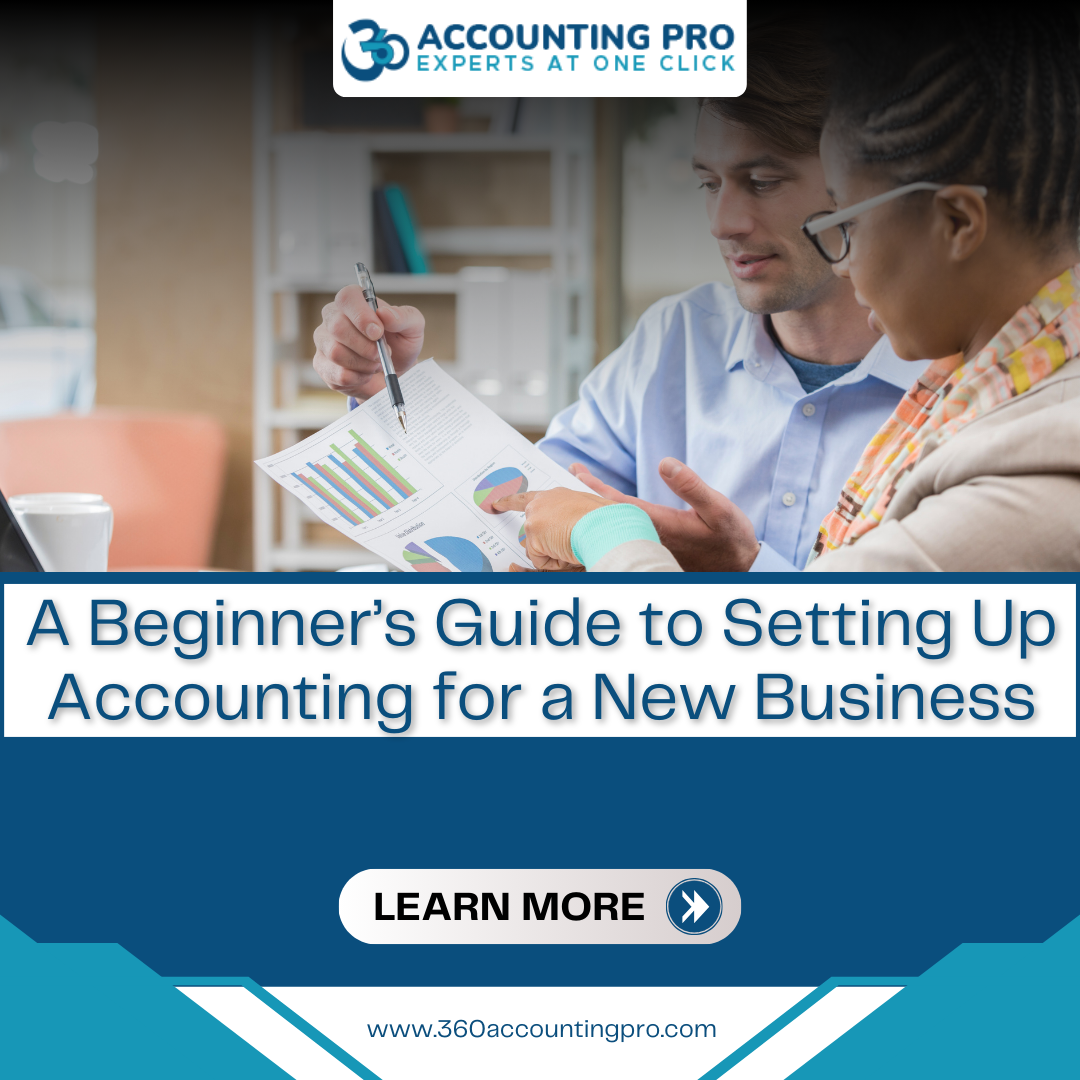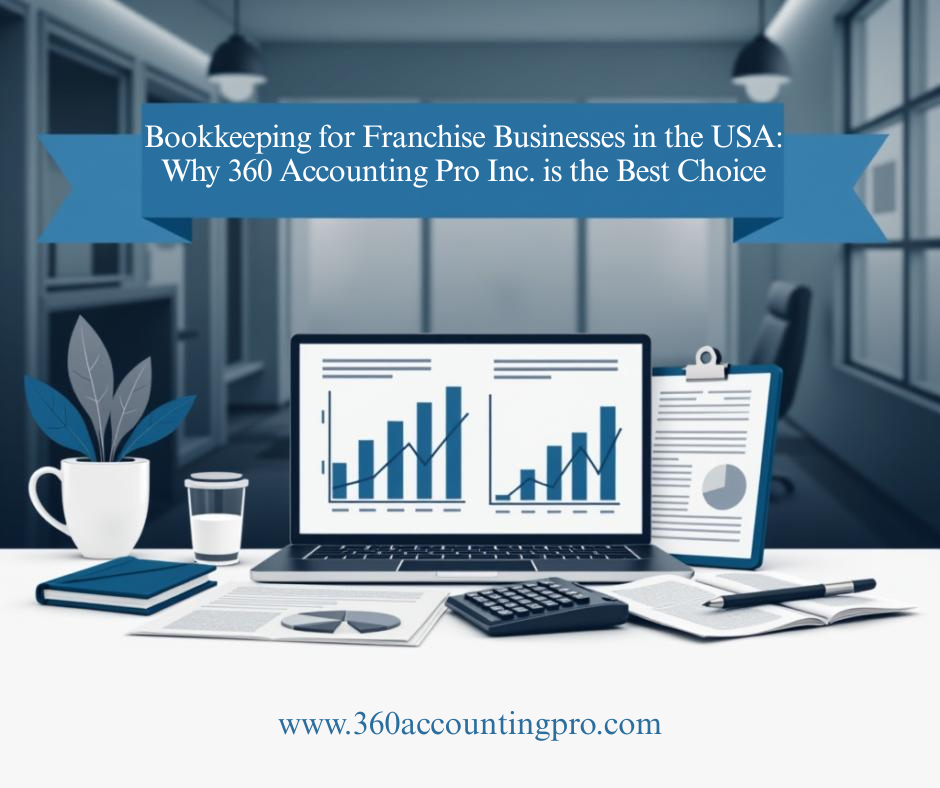

23-05-25
Starting a business is exciting — but managing your finances correctly from day one is essential for long-term success. Without proper accounting, it’s easy to lose track of expenses, miss out on deductions, or run into cash flow problems.
In this guide, we’ll walk you through the essential steps to set up accounting for your new business, even if you have no prior experience. Plus, we’ll show you how 360 Accounting Pro Inc can help you stay organized and tax-ready from the beginning.
Your accounting method and tax obligations depend on how your business is set up. Common business structures include:
Sole Proprietorship
Partnership
Limited Liability Company (LLC)
Corporation (C-Corp or S-Corp)
Each structure has different tax rules, so choose one that aligns with your goals and consult an advisor if needed.
One of the first things you should do is open a dedicated business bank account. This helps separate your personal and business expenses, which is crucial for clear record-keeping and legal protection.
Tip: Open both a checking and savings account. Use the savings account to set aside money for taxes or emergencies.
There are two main accounting methods:
Cash Basis: Record income when received and expenses when paid
Accrual Basis: Record income when earned and expenses when incurred
Many small businesses start with cash basis accounting because it’s simple. However, some businesses prefer accrual for more accurate long-term tracking.
A Chart of Accounts is the foundation of your bookkeeping system. It organizes your business transactions into categories like:
Revenue
Expenses
Assets (bank accounts, inventory)
Liabilities (loans, credit cards)
Equity (owner’s investment)
Using a well-structured chart of accounts makes it easier to generate reports and file taxes.
Instead of using spreadsheets, choose a cloud-based accounting tool that automates much of the work.
QuickBooks Online
Xero
Wave (free option for small businesses)
These tools connect to your bank, generate reports, and simplify bookkeeping tasks.
Every dollar that comes in or goes out of your business should be recorded. This includes:
Sales revenue
Vendor payments
Office supplies
Marketing and advertising
Subscriptions and software tools
Meals, travel, and business-related expenses
Tip: Save receipts digitally and attach them to each transaction in your accounting software.
A startup budget helps you plan for fixed costs and estimate your break-even point. Once your business is running, use cash flow reports to understand how money moves in and out of your business each month.
Tip: Always have at least three months of operating expenses set aside.
Depending on your location and structure, you may need to register for:
Sales tax
Payroll tax
Self-employment or corporate tax
Quarterly estimated taxes
Working with a professional early can help you stay compliant and avoid penalties.
Reconciling means comparing your records to your bank statements to ensure accuracy. It helps catch duplicate entries, missing income, or errors early.
As your business grows, managing accounting on your own becomes harder and riskier. An experienced accountant or bookkeeper will help you:
Stay compliant with tax laws
Maximize deductions
Create meaningful reports
Save time and reduce stress
At 360 Accounting Pro Inc, we specialize in helping startups and small business owners set up their accounting systems the right way. We provide:
New business bookkeeping setup
Accounting software selection and setup
Chart of accounts customization
Monthly bookkeeping and reporting
Tax planning and quarterly filing support
Ongoing advice to help you grow profitably
Whether you need one-time setup help or ongoing support, we build financial systems that grow with your business.
Starting a business is a big step. Setting up your accounting system from the beginning saves time, reduces risk, and helps you make smarter decisions.
Let 360 Accounting Pro Inc help you build a solid financial foundation for your business. Contact us today for a free consultation and take the guesswork out of your finances.
Tags : starting a business accounting, new business accounting setup, small business bookkeeping, business financial management, accounting for startups, bookkeeping for entrepreneurs, set up business finances, choose business structure, business bank account tips, chart of accounts for small business, cash vs accrual accounting method, small business accounting software, QuickBooks for startups, Xero for small business, Wave accounting tool, track business expenses, startup budget planning, business cash flow tips, tax obligations for small business, reconcile business accounts, hire an accountant, business tax planning, accounting help for new businesses, 360 Accounting Pro Inc, small business financial guide, accounting checklist for startups


















































.jpg)
.jpg)
.jpg)
.jpg)


).jpg)














 Get A Quote
Get A Quote
Leave A Comment